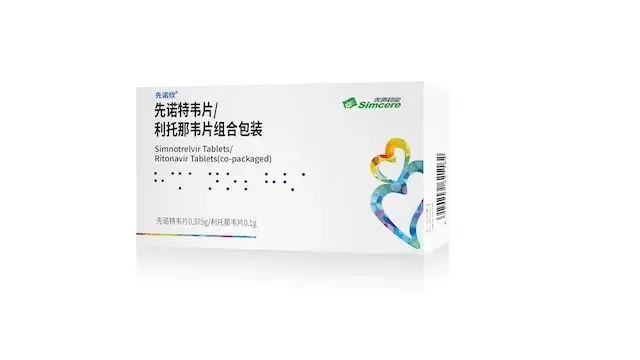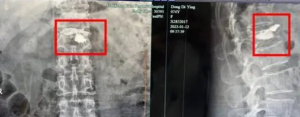
Two new domestic oral crown drugs approved for marketing! What is the price and efficacy
Two more domestic new crown oral drugs were approved for marketing.
On January 29, the official website of the State Drug Administration (SDA) released news that recently, the SDA, in accordance with the relevant provisions of the Drug Administration Law, conducted emergency review and approval in accordance with the special drug approval procedures, and conditionally approved the Class 1 innovative drug centronavir tablets/ritonavir tablets combination package (trade name: Centronoxin) declared by Hainan Centron Pharmaceutical Co. Ltd. declared the Class 1 innovative drug deuterium rimivir hydrobromide tablets (trade name: Mindvir) to market. Both drugs are oral small molecule neocoronavirus infection treatment drugs for adult patients with mild to moderate novel coronavirus infection (COVID-19).
Hainan Centrum and WangShiBio are companies under the listed companies Centrum Pharmaceutical (02096.HK) and JunShiBio (01877.HK, 688180.SH) respectively.
It is worth noting that these two drugs took no more than half a month from the time the marketing applications were accepted to the time they were finally approved.
Up to now, five new oral crown drugs have been approved for listing in China, of which three are domestically produced and two are imported.

How effective
The two newly approved domestic new crown oral drugs are different in their targets, among which Centrum Pharmaceutical’s Centrum belongs to 3CL protease inhibitor, which is the first domestic 3CL oral small molecule drug listed; Junshi Biological’s Mindve belongs to oral polymerase (RdRp) inhibitor.
From the perspective of therapeutic mechanism, 3CL protease inhibitors inhibit the activity of this enzyme to stop viral replication when the neo-coronavirus replicates, and RdRp inhibitors work by “tricking” the viral RNA polymerase to bind to itself (drug) in order to stop viral RNA replication.
The current global anti-neo-coronavirus drug development is also focused on these two major targets. It is worth mentioning that the other three previously approved oral NIV drugs, including Pfizer’s Paxlovid (imported drug, referred to as “P drug”), are 3CL protease inhibitors; real biological Azulfidine tablets (domestic drug) and Merck Sharp & Dohme’s Monoravir capsules (imported drug) are RdRp inhibitors.
What is the efficacy of these two newly approved domestic new crown oral drugs?
The results of the Centronoxin study by Centron Pharmaceuticals showed that in adult patients with mild to moderate neo-crown infection, treatment in the Centronoxin group was effective in shortening the duration of disease and rapidly and substantially reducing viral load. The time from first dose to complete resolution of 11 associated symptoms was significantly reduced by approximately 1.5 days in the Centronix group compared to the placebo group, with a significant reduction of approximately 2.4 days in the subgroup at high risk of severe disease, and the data suggesting superior efficacy with early use. After a full 5-day course of treatment, viral load was significantly reduced by approximately 96% and the time to nucleic acid regression was significantly reduced by approximately 2.2 days in the Cianoxin group. Safety data showed that pregabalin was well tolerated in Chinese patients with mild to moderate neoconvolution. Detailed data from this study will be presented in future academic journals or conferences.
Prior to the acceptance of Juniper’s domestic marketing application for Mindevi, on December 29, 2022, the New England Journal of Medicine published online the results of a phase III clinical study of the drug compared to Pfizer’s new coronary oral drug Paxlovid for the early treatment of patients with mild to moderate COVID-19 with high risk factors for progression to severe disease, including death, showing that the study’s intended endpoints met the design non-inferiority endpoint, with a shorter clinical recovery time (4 days vs. 5 days) and fewer safety concerns in the Mindvid group compared to Paxlovid.
Domestic 3CL oral drug will be less expensive than P-drugs
It is interesting to see at what price the newly listed Centrum Pharmaceuticals Centrum and Junshi Biologicals’ Mindvid will be sold.
On January 18, Real Biologics’ Azulfidine tablets have successfully entered the 2022 version of the National Health Insurance Drug List through price reductions in negotiations, resulting in a bottle of 35 tablets (1mg size) of Azulfidine tablets dropping from a health insurance payment price of 270 yuan to about 175 yuan.
Pfizer’s Paxlovid, on the other hand, was dropped from the 2022 version of the National Health Insurance Drug List, and its current provisional health insurance payment price in some parts of China is 1,890 yuan per box. Merck Sharp & Dohme’s Monoravir capsules missed the Medicare negotiations due to its late approval, and its current offer is quoted at 1,500 yuan per bottle (40 capsules).
At present, the first financial reporter learned from Centrin Pharmaceuticals that Centrin will be put into production immediately after being approved for marketing. After entering circulation, Centrin will serve the needs of patients through hospitals, online Internet hospitals and other channels. As a domestic innovative drug with fully independent intellectual property rights, the price of Centronoxin will be significantly lower than the same target drug Pfizer Paxlovid.
Centrin Pharmaceuticals said that according to the “New Coronavirus Infection Prevention and Control Program (10th Edition)” previously released by China, and the “Notice on Optimizing Medical Protection Policies for Patients with New Coronavirus Infection after the Implementation of “Class B B Control” recently released by the National Health Insurance Bureau, Centrin will automatically enter the “New Coronavirus Prevention and Control Program” after its approval. The latest version of the “New Coronavirus Prevention and Control Guidelines” will be included in the temporary medical insurance drug list, and the purchaser will only be required to pay the personal out-of-pocket portion after medical insurance reimbursement.
The National Health Insurance Bureau issued on January 6, the “new crown treatment drug price formation guidelines (for trial implementation)”, proposed to adhere to the market to determine prices, respect the basis of enterprise independent pricing, better play the role of the government, the introduction of medical institutions and industry associations to participate in social governance, to guide enterprises to openly and transparently set reasonable prices for new crown treatment drugs.


Average Rating